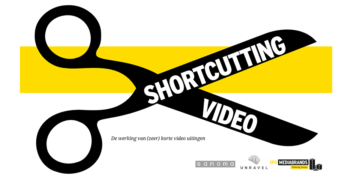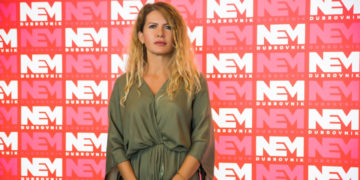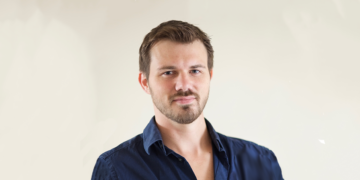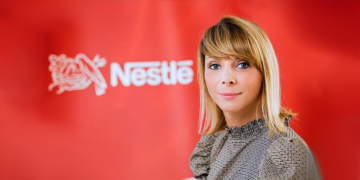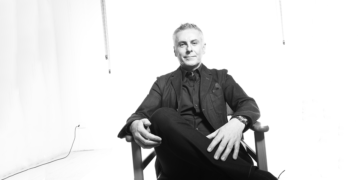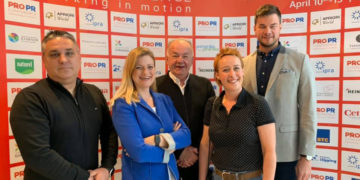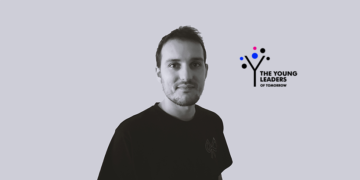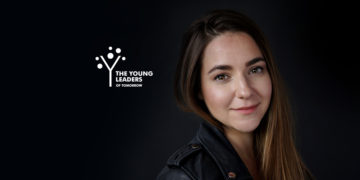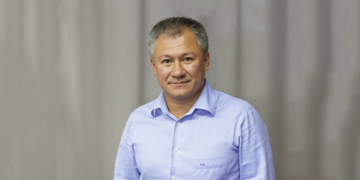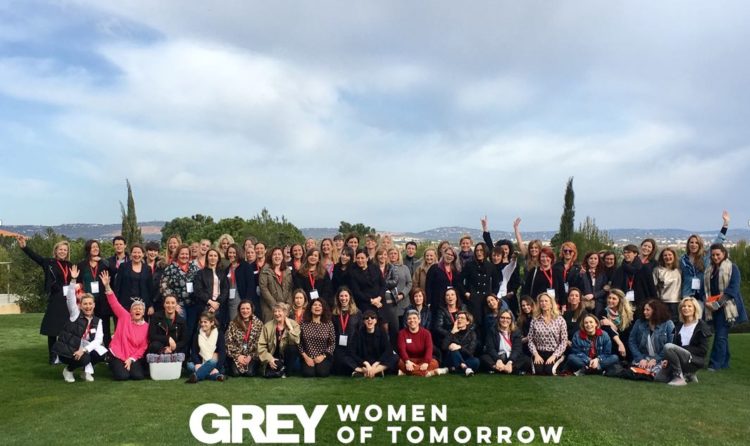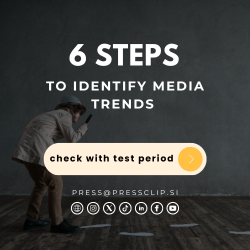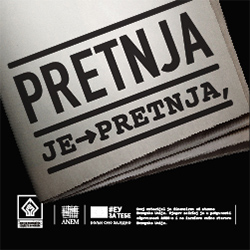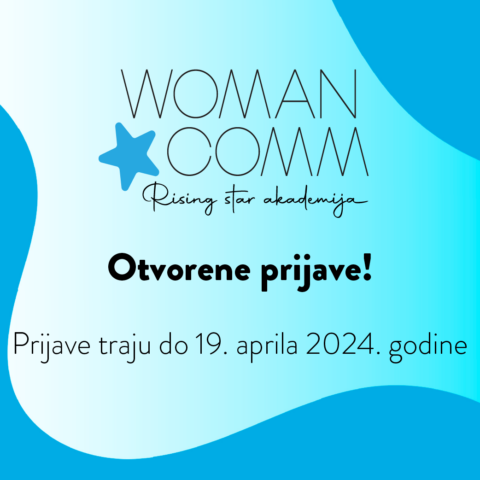Drugi jezik na kojem je dostupan ovaj članak: Bosnian
In January this year, Grey Europe organized a women’s only conference called Women of Tomorrow, as part of its regular annual conference. In the spirit of the increasingly active movement for gender equality, this time the regular conference was held with an impressive and praiseworthy ratio – equal number of women and men. For comparison, it’s enough to say that in the previous years the proportion of female participants versus men was only 22 percent.
Women of Tomorrow was hosted by Shine for Women organization whose mission is to get as many women as possible in managerial positions in companies, with a clear message that a balanced work environment achieves better business results in terms of greater profit, excellence in creativity and team management.
Two brilliant women, Anna Baréz-Brown and Caroline Whaley, launched Shine for Women after a long and successful business journey on which Anna made her career in the media, and Caroline spent many years in brand marketing for Nike and The Nike Foundation. Anna and Caroline took us through the conference in a natural, spontaneous and well organized manner.

In the company of my colleagues from the agency, client service director Maša Ivanov and finance manager Matija Mandić, I embarked on this two-day journey, rich in knowledge and experience. As a great fan of personal development, I often attend similar seminars and I was thrilled with the opportunity to dedicate two days to myself and the hidden aspects of my being, that we are not often aware of, but which affect not only our business context, but our life path and decisions in general. It is not my intent to convey only my own vision of the conference that was of great value to me, but also to give a personal view of gender equality that was not a subject of this conference.
To begin with, through a series of interactive exercises, we explored where we currently stand in life – not just in business but also in private context. We did this first and foremost through raising awareness of our own values, our positive, and even those we perceive as negative traits, our roles and patterns, and by raising awareness of business and private reality.
Furthermore, the second part called Playing the Bigger Game, referred to the projection – where we see ourselves and how we can get there, or rather what are the brave steps that will lead us to the desired goal. Playing a bigger game is a technique that can help us discover our own individual purpose, and shed light on the way in which that same purpose is interwoven with the organizational purpose. The last part of the conference was devoted to increasing gender equality in your own organization.
How can we better govern ourselves?
Through various methods and techniques, from visualization, collage to quick talk, we dived into our subconscious, beyond the known zone of the conscious mind and into the deeper part of us, which hides our authentic wisdom and truth. Not what we think we should do or what is expected of us, but what is in line with our authentic Self. We delved into the important aspects of self-management, and received simple, but powerful tools that can help us better manage ourselves.
One of these tools is managing your own energy in ways that raise awareness of situations that can initially seem to be outside our area of influence.
Once we identify the situations that are important for us, we can return them under our influence, and the rest, those we cannot influence, we can dismiss so we wouldn’t waste energy on them.
Self-confidence and belief in oneself is a major stumbling block in the careers of many women. Many of us are all too well familiar with the fear that imbues all our relationships, business ventures and the feeling that everyone will discover how we really are – which for some of us is just one big bluff. We fear that others won’t like us, we fear judgment, we fear failure, we fear even that we are lousy mothers, and business women and wives.
Numerous studies in different industries show that women often experience their own business performance worse than it really is, unlike men who in the same context perceive themselves much better than they really are.
The reason for this lies in the fact that women and men are biologically different. Although both have both qualities, male and female, in general terms, women will react more emotionally because of the biological difference, and consequently they will underestimate themselves and be more insecure. Men will respond more rationally and aggressively and will therefore overestimate their own abilities.
Sheryl Sandberg, Facebook’s COO, in her book Lean In often refers to her own insecurity and lack of confidence. During the student days, she and her friend spent months preparing for the exam on European history. Sheryl and her friend read all the books on the topic – as many as 10 – and before that they regularly attended all lectures. Sheryl’s brother read only one book, he was present at two lectures, and he asked Sheryl and her friend to help him prepare for the exam the day before the exam. Sheryl recalls that she and her friend after the exam came out confused and unhappy because they forgot to write some things. On the other hand, though he invested minimum preparation, her brother was satisfied, after getting a straight A, same as the two of them. What Sheryl realized at that moment was that she and her friend, unlike her brother, were actually insecure in themselves. Since then, Sheryl has learned to manage her feeling of insecurity and doubt, and she did that by confronting her own beliefs. For example, if she thought she was not capable of doing something, she would remind herself how she resolved a similar thing in the past, and would realize that ultimately, no matter how extreme it sounds, she never ended up on the street as a homeless, without food, friends, and money.
By going through a simple exercise, in a similar way we learned to manage our own fears, also confronting our own beliefs, questioning if they are really true? This seemingly simple exercise reminded me of Katie Byron, who in the book Loving What Is developed a work process consisting of four questions. When you apply them to a concrete problem, these questions allow you to look at the situation in a completely different light. “It’s not our thoughts, but our attachment to our thoughts, that causes suffering,” says Katie Byron. Through her method, we also examine the truthfulness of our thoughts and beliefs. Liberation comes when we realize that the stories we tell ourselves are not true, and at that moment we really can love what is, exactly as it is.
One of the most important exercises is the revelation of so-called gremlins – that tiny little voice in our heads telling us we are not good enough, we are this or that, mostly with a negative prefix. It is the voice with which we stomp ourselves, and because of which we run into various defensive mechanisms, some of which may appear to be socially acceptable, such as perfectionism, but which often hide the feeling of own worthlessness. Such gremlins have an attractive nature, so it’s not uncommon that they appear within the same organization, thus forming a corporate meta-gremlin. In the same way in which individuals have unconscious parts of themselves – which Jung calls shadows – the organizations have them as well.
Accepting one’s own gremlins, but also the life challenges that bring those gremlins to the surface, is nothing but a call to growth and the development of consciousness. As life coach and author Ifeanyi Enoch Onuoha said: when we find ourselves on life’s fork in the road, and need to decide where to go, forward, backward, breakdown or breakthrough, we can always choose the latter, and it’s the same in the context of raising awareness and managing our own gremlins.
Good things about diversity
The conference was marked by numerous great moments and takeaways. One of them is multinationality that greatly contributes to creativity, openness and enrichment of cooperation. New energy, ideas and different cultures can contribute to a new perspective, views and the expansion of one’s own familiar zone of comfort. Multiculturalism acts on me as oxygen that fuels the fire of creativity.
Regardless of the fact that we have different experiences and customs, in essence, we all have the same problems and a developmental path that we cannot skip. When we are ready – and it’s usually when we think that we are not – some Kraken or a Leviathan jumps out of the depths of the sea (our subconscious minds) to remind us from time to time that there are still places to explore and spaces where we can grow. Otherwise, the same archetypal monsters would not even exist, either in us or outside of us.
What connects and defines us as a species is the ability of social interaction and empathy. It was inspiring to listen to individual stories of women and their open sharing of their own problems that they face daily in a business environment. Such sharing and conversations have contributed to more authentic and open relationships, creating invisible connecting threads among the women that meet each others for the first time. By getting to know others, not only through their strong sides that are traditionally attributed to male values, but also through those that expose us and make us socially vulnerable, we gain in humanity, authenticity in expression, and willingness to help each other.
In the book Reinventing the Organizations, Frederic Laloux mentions new types of organizations, the so-called Teal organizations in which one of the main pillars is wholeness. It means creating not only the image of a professional self through exclusively male attributes such as determination, confidence, speed and the like. Equally accepting vulnerabilities, insecurities and fears reveals to us the way we truly are, and contributes to a different business atmosphere that includes authenticity and closeness.
By incorporating a female principle, we bring warmth to communication, strengthen relationships and build cooperation. Traditionally female qualities promote harmony and cooperation and create quality collaborative organizations in comparison with traditionally male qualities such as competitiveness and competition. Indirectly, the isolation and distancing disappear, melting down the cold armor that is so characteristic of business circles.
In the future business context, respect for both male and female qualities and their equality is of paramount importance. It is through the use of these differences that we can achieve more advanced and quality relationships on which organizations that are in all aspects better than they are now can rest.
Personal development of an individual and its importance for organizations
Everyday rising of awareness of the beliefs, patterns, and feelings associated with these patterns is the most precious gift we can give to ourselves, both privately and business wise, whether we are men or women. Organizational management primarily implies the notion of self-management, which is not possible without awareness of oneself.
Self-awareness enables us to truly know ourselves and our patterns of behavior through which we function daily in any context. When we talk about how these patterns create and affect our relationships, we talk about a kind of litmus paper, because the way we treat others is the way we actually treat ourselves.
Seminars as this one give us the opportunity to dig deeper under the surface and see what we are really made of, gradually, with a lot of love and understanding of our own growth and development that is coming along that path. Turn to oneself and dive into the hidden parts of oneself – that takes genuine courage.
The imperative and precondition of new leadership is personal development. As much time as we are willing to invest in ourselves and our employees, as much we are capable of creating new working environments as organizations and individuals – environments that are inclined towards understanding and empathy, and which are consequently more humane and include the heart, not just the head.
When I was making our agency presentation with references, I added a page I’m very proud of, and that is the fact that our agency had its own psychiatrist. Working intensively on ourselves as individuals, and then as an organization, we created better relationships, better working environment, and eventually better business results. I believe that the readiness of the leadership of any organization to actively invest in personal development is something that we all need to fully support and advocate.
Gender equality and individual responsibility
I’m going back to the topic of gender equality at work. The centenarian suppression of the female principle has somehow influenced us all, and it has rooted in the stereotype that defines male and female roles and acceptable behaviors.
In the fifties and sixties of the last century, women were attributed value through the role of a perfect housekeeper, wife and mother who devotes her whole life to a submissive role. In The Hours, Julianne Moore plays Laura Brown, a housewife who in 1950 found her home life as a prison. Despite having a husband and child who obviously worship her, Laura is struggling with the fact that she cannot find the fulfillment she seeks in life through the role of a wife and mother that the society had predestined for her. All women in this film are in some way dissatisfied with the restrictions and constraints imposed by society.
#MeToo Movement, initiated because of the scandals with Harvey Weinstein and other horrible testimonies of abused women where men continue to treat women as sexual objects that only meet their needs, has only recently updated this issue in our society. The Hollywood dream industry became a nightmare industry when the long-hidden creatures began to creep out of it, and they quickly started becoming visible in other industries as well. Such harassments are the hidden reality of the treatment of women in modern society.
In her book Lean In, Sheryl Sandberg lists very interesting facts that show how society treats women. Women are not expected to achieve success in their career, while in men it is implied, and what is shocking is that attractiveness and success did not correlate positively with women, while they were seen as positive with men. In other words, unlike men, a successful woman is not sympathetic. “We have been treated differently since we were kids, and we still come across t-shirts saying smart like daddy and pretty like mommy,” says Sheryl.
We are no longer talking about the fifties and sixties of the last century. This worldview is still present in the 21st century. It teaches us that it is desirable of us to be kind, nice and gracious, and to suppress our aggressive side, our anger, and it is therefore not surprising that a vast majority of women today has challenges with setting boundaries.
In the business context, all this is reflected in a smaller number of women in leading positions. Data show that out of 195 independent countries, only 17 of them are led by women, women’s representation in parliaments is only 20 percent, and even less, 18 percent, are in government. Among Fortune 500 managers, only 21 are women. Women account for only 14 percent of managerial positions, and there’s only 17 percent of them in company boards.
But what’s most important is that this is reflected in all segments, not just in the management structures. Some women who decided they did not want to have a career and have chosen a different way of life, in everyday life situations still face the same prejudices.
We all have great responsibility in this context. Male colleagues should ask themselves what they think about their mothers, wives, daughters, colleagues. We women can also ask ourselves what we feel and think about our husbands, fathers, sons and, most importantly, ourselves. Sometimes very simple statements such as ah, women, or all girls are … reveal deeper convictions that we do not recognize on a conscious level. On the other hand, similar statements by women who classify male behavior are the answer to what women really think about men.
Socially imposed roles often don’t suit us, but yet we agree to them.
We suppress the hidden objection to others, without even being aware that we have created these internal barriers ourselves. We are the transmitters of the social scenario. Our role and responsibility in early education is of crucial importance and only we can disrupt the transfer of stereotypical roles to the next generation of sons and daughters.
What is definitely visible in all segments is that the female principle wants to come to the surface, and we can see and feel it lately. As the society and collective consciousness develop, women are awakening in all their aspects – from sexuality, career development, life energy, and celebration of self and what they really are. Women of Tomorrow is one such step that can help all women in their empowerment in organizations and achieving a more balanced working environment.
Work on oneself is the first step to truly change ourselves, to break down our internal barriers, and to reprogram the code of convictions that no longer serve us. Only when we take responsibility for our beliefs, thoughts, words, and actions can we open up to further growth and development.
On this journey, we can make a series of operational steps that can help our narrow community and our organization to strive for that. But we can also change the paradigm, instead of focusing on external work, which can be a step in the right direction. Only with complete internal change can we change our outer world, not vice versa. In that, the responsibility for change lies not only with us, but with our organizations as well. It is impossible to change others – the only thing we can do is change ourselves.
Thank you to Women on Shine, thank you women from the Women of Tomorrow conference and thank you men and women of Grey Europe who made all this possible. We can be happy that we live in times when women of tomorrow are becoming women of today.




